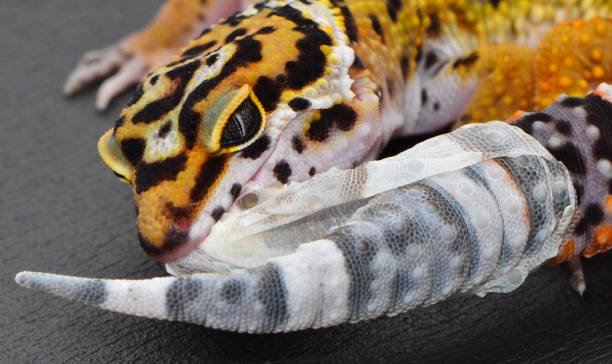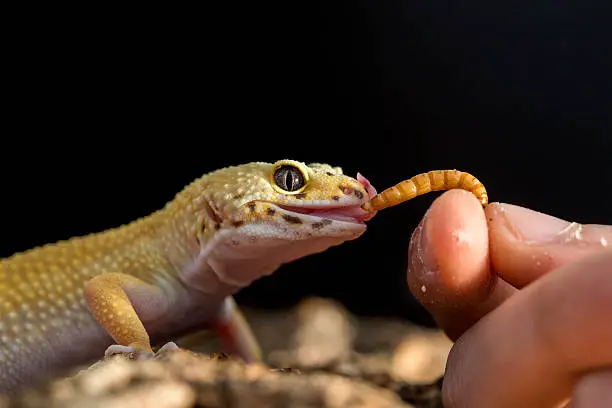A leopard gecko’s bite is not necessarily intended to hurt you. Leopard geckos are very curious, and when they see something new, they want to investigate. They are very playful, and it is usually their way of playing or trying to get some attention and not an attempt to hurt you. This article will investigate why could a leopard gecko try to bite people.
In this article
Why do leopard geckos try to bite people?
Geckos may try to bite for various reasons, including being aggressive, mistaking your hand for food, and being scared or annoyed. Baby geckos are more likely to bite you than adults since they are curious and still learning the domesticated environment.
Is it normal for a leopard gecko to bite its owner when frightened? No. Leopard geckos will generally opt to run away and hide when they feel scared. They are less likely to fight or attack their owner.
Here are actual scenarios a leopard gecko may try to bite:
When Hungry:
Geckos tend to be very skittish when hungry. Before you touch your gecko, you should always feed them to ensure they don’t bite you. This is because, in anticipation of feed, their brains will register anything entering their tank to be food – including your hand.
When Defending its territory:
When you touch a male leopard gecko, it will leave its scent on your hand. Another male will mistake your hand for that of a different male gecko. Since male geckos are very territorial, they will most likely bite your hand in an attempt to defend their territory.
This is why you should only keep one Leopard gecko per tank. Ensure you thoroughly wash your hands to remove all scents between attending two different geckos. Female geckos can also be territorial and bite, but males are more pronounced.
Excessively aggressive Geckos:
Some Leopard Geckos can overly and persistently become aggressive unprovoked in sporadic occurrences. Typical attempts to pick up these Geckos can result in you getting bitten by them. In such cases, leaving the Leopard Gecko alone is advisable.
Trauma from past experience:
Your Leopard Gecko may have been mistreated in the past, causing him to associate you with the situation. For instance, they may be unnecessarily defensive if someone tries to take them from the cage. Ensure you purchase them young and from a verified breeder who can share the gecko’s true history with you.
What can I do to prevent my leopard gecko from biting me?
- Be gentle and reduce handling when it is unnecessary.
- Ensure the leopard geckos are well fed before handling or playing with them.
- A Leopard Gecko’s initial months in a new home can be stressful. They are very sensitive to sudden movements. Minimize these to help them feel comfortable and reduce the chances of biting when approached.
- Announce your presence consistently and predictably whenever you approach their tank. You might frighten him by yelling at him.
- Look out for an aggression sign and avoid handling the geckos when the signs are evident. Such signs include; snapping or barking, waving or raising tails, e.t.c.
- A nervous or shy animal may attempt to bite when frightened. Geckos are harmless, but they may bite when threatened or scared. To prevent bites, don’t frighten or disturb them in any way.
- When a leopard gecko sheds, it can be dangerous to reach for it. They might mistake your finger for their skin and bite you. These bites may hurt more since the force used by the shedding bite is significantly higher.

- Keep a keen eye on how your young children interact with the leopard geckos. Observe if they are being overly aggressive and keep them apart. This is the best way to prevent a bite from happening.
- Don’t drop, scream or put your leopard gecko back in its tank when it bites you. Right away, putting your gecko back will teach him that this is the way to be let go. This will be an invitation to future repeat bites. Be calm and keep holding it gently; after all, the bite may not hurt at all.
- Do not force your leopard geckos out of their hideout if they are not in the mood to play.
What’s the worst that could happen when a leopard gecko bites you?
Some leopard geckos can be aggressive and bite more often, especially the wild-caught types. The bite itself is not dangerous, but if the bite draws blood in a rare occurrence, it is best to seek medical help. This is to be sure there is no exposure to a bacterial infection.
Captive-born leopard geckos are not carriers of disease and do not have salmonella. They come from a dry environment and are not susceptible to this bacteria.
The bite of a leopard gecko is not poisonous. If you break the skin, wash the bite thoroughly with soap and clean water as you could attend to any other minor skin injury.
However, as a rule of thumb, have your vet attend to your geckos on a regular check-up to ensure they remain healthy and safe in your homestead.
Conclusion.
If you have a pet gecko, you can avoid a biting incident by being calm, patient, and empathetic while raising your pet. You can also raise your gecko to be a loving and loyal pet that will treat you with the same kindness and understanding that you provide it with.
If you still have problems with your gecko biting you, you may need to find a veterinarian who can help you figure out why your gecko is acting that way.
If your leopard gecko bites you, don’t be alarmed. It is likely that your leopard gecko accidentally bit you. Do not throw away or drop your leopard gecko if bitten.

